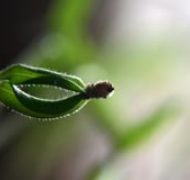Do You Feel Broken and Fragmented?
Blog / Produced by The High Calling
Sometimes we can feel torn in two. Rent right down the middle, trying to decide how to stretch ourselves between those things we've categorized as either sacred or secular. But what if those categories really don't matter? What if there is no difference in the way God sees the work we do? What if our "everyday, ordinary life" is holy? All of it "avodah." Ann Voskamp shares how the scriptures use avodah to weave a lovely tapestry. Not fragmented or categorized at all.
God has only one loom.
You wouldn't think so by the fragmentation of our lives. Our days look like the scrap floor of a studio, frayed bits of work, remnants snipped off family, a heap of countless fabrics—ministry, creativity, worship, volunteerism. We're ripped into pieces, and putting our lives together again is like turkey stitching a crazy quilt—driving us a bit crazy.
We've sheared the textile of our own lives. And it's time to put down the scissors. Why cut up 100% pure avodah?
That's what God's weaving. God doesn't experience a disconnect between our screens and our sanctuaries, between the people on our street and the paintbrushes on our desk. We have these labels for the bits and pieces of who we are and what we do. But God takes up the all the threads of being and weaves them into a seamless silk. He calls it avodah.
The Fabric of Work
He began the weaving in the beginning. "The Lord God took the man and placed him in the Garden of Eden to work it and take care of it" (Genesis 2:15). We read the translated word "work" and think that is what God meant for us to do. The Hebrew word is avodah. It is the same word in Exodus 34:21, in the writing of the Ten Commandments, "Six days you shall work…." Six days you shall avodah.
The Fabric of Worship
But we know we're meant for more than work. We know we're meant to glorify God, to worship with our lives. Exodus 3:12 speaks to God's serious call to this life of worship: "When you have brought the people out of Egypt, you will worship God on this mountain." We read "worship." In Hebrew, the word reads avodah.
The Fabric of Service
And yet God Himself calls us to even more than work and worship. Deuteronomy 10:12 records the question and answer: "So now, O Israel, what does the Lord your God require of you? Only to fear the Lord your God, to walk in all his ways, to love him, to serve the Lord your God with all your heart and with all your soul." We read the English translation: to serve—to minister unto God, unto his people, unto the needy, the seeking, the hurting. The Hebrew original: avodah.
The Fabric of Creativity
We work. We worship. We serve. But there's another integral element to our identity as human beings, the part that we've inherited from our Father who can't stop creating, producing designs, dreaming beauty. 1 Chronicles 28:21 refers to these innovative, imaginative efforts: "The divisions of the priests and Levites are ready for all the work on the temple of God, and every willing man skilled in any craft will help you in all the work." The text renders it as craft—creative acts, the arts—and God whispers again: avodah. He emphasizes his singular loom by whispering avodah twice in this one verse: work and craft are both expressed as avodah in the original Hebrew.
The ancient Hebrews even used the term avodah to describe the sacrifices offered in the temple. And that is the key. To live a fully devoted, interwoven life, we must see everything as a sacrifice to God.
Nearly four hundred years ago, a man peeling potatoes as an act of worship, Brother Lawrence, said, "Our sanctification does not depend as much on changing our activities as it does on doing them for God, rather than ourselves." We don't need to change activities from monetary work to missionary work to be devout. That very construct is false. All Christians are in full-time ministry. So we can stop tearing our lives into the categories of worldly and spiritual. We can put away the scissors of selfish ambitions and self-seeking comfort and self interests. If our lives feel fragmented, it's because we are tearing up God's one-piece fabric.
We wear God's seamless silk when we mindfully offer everything we do as a sacrifice to God. Paul explained this clearly to the Romans: "So here's what I want you to do, God helping you: Take your everyday, ordinary life—your sleeping, eating, going-to-work, and walking-around life—and place it before God as an offering" (Rom. 12:1 MSG). When we see our lives as a sacrificial offering unto the Lord—avodah—our work becomes art and our art becomes ministry and our worship becomes serving and our serving becomes work.
Just as the "LORD our God is one LORD" (Deut. 6:4), so our God weaves all of life on only one loom, and there is only one word for the whole of lives rightly lived in sacrifice to Him.
100% pure Avodah.











